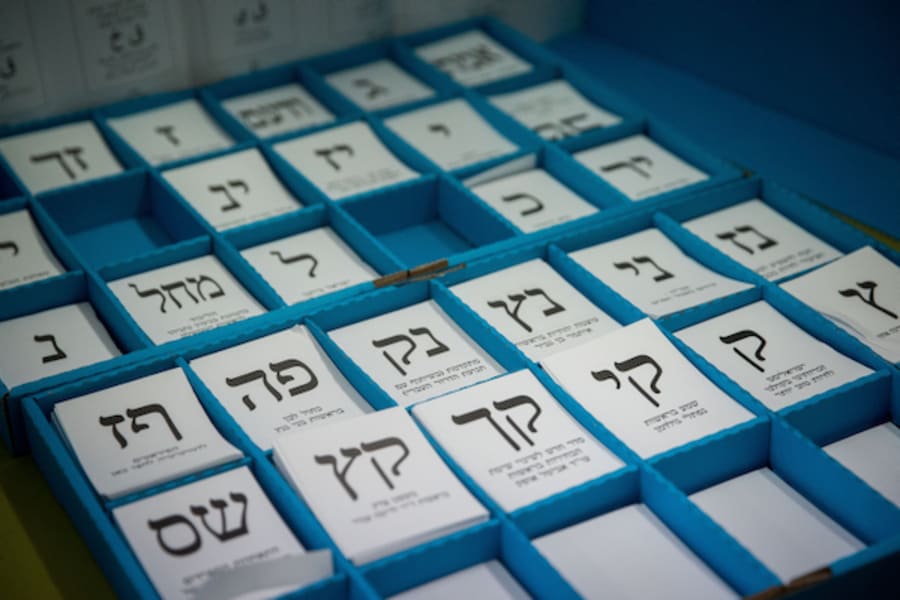‘Traditional’ Jews could decide Israeli election in November
Israel Democracy Institute survey shows that in previous election, Netanyahu's party got most traditional votes – but still 60% went to other parties

"Traditional" Jews in Israel will have a decisive influence over the results of Israeli elections, according to new data released last week by the Israel Democracy Institute (IDI).
“While among ultra-Orthodox, religious-nationalist and seculars there is a clear preference for one of the camps, the traditional public is in-between the two, which, most likely, makes it easier for this sector to shift between the different parties,” IDI’s Ariel Finkelstein explained in a release.
IDI compiled and released data based on 21 surveys carried out by its Viterbi Family Center for Public Opinion and Policy Research over the past year, between April 2021 and June 2022. In each of those surveys, the center asked the public to define their religious affiliation using the accepted Central Bureau of Statistics (CBS) categories and to answer the question of who they voted for in the March 2021 election.
The five categories of religious affiliation include Haredi, religious, traditional religious, traditional non-religious and secular. IDI further broke down the categories, dividing traditional Jews into non-religious and religious and adding a category that it calls national-Haredi Jews.
The term "traditional" – masorti in Hebrew – is used by Jewish Israelis who celebrate the holidays, keep many Jewish customs to varying degrees and support the Jewish character of the State of Israel, but they may or may not be strictly religious or keep kosher. While not a denomination, it is a widely-used label by traditional Jews themselves to define their lifestyle.
While some 13,070 people responded to the poll, 6% confirmed they either did not vote or submitted a blank ballot and another 5% refused to say which party they voted for, resulting in a total of 11,577 eligible participants.
Of the respondents, 5,084 were secular Jews (44%), 2,603 traditional non-religious Jews (22%), 1,267 traditional-religious Jews (11%), 1,151 national-religious Jews (10%), 200 national-Haredi Jews (2%) and 1,272 Haredi Jews (11%).
This is a representative sample of the Jewish population in Israel, as defined by the CBS.
Among the traditional public, the most popular party was Likud, which received 39% of traditional votes. However, Yamina – the party that ran under former Prime Minister Naftali Bennett’s leadership in March – received 14%, Yesh Atid under Prime Minister Yair Lapid 11%, Blue & White under Defense Minister Benny Gantz 10%, and New Hope under Gideon Sa’ar 8%.
Another 18% went to other miscellaneous parties, ranging from religious parties like Shas to secular parties like Labor.
In other words, more than 60% of traditional Jews voted for parties other than Likud, a “surprising statistic,” Finkelstein explained, considering the assumed correlation in public discourse between the traditional sector and the Likud party.
More than half of Likud voters defined themselves as traditional, among them 64% who identified as traditional but not religious and 36% who said they were religious. Put another way, more than a third (36%) of Likud voters overall are traditional non-religious, and less than a quarter (20%) are traditional-religious.
During the previous four elections, the main question was whether the parties or the public supported former Prime Minister Benjamin Netanyahu, and this will be the question again, said Eytan Gilboa, director of the Center for International Communication and a senior research associate at the Begin-Sadat Center for Strategic Studies at Bar-Ilan University.
IDI’s data showed that, on one hand, in the last election, there was a clear preference among the traditional religious public for parties identified with the right-wing Netanyahu bloc, including Haredi and Religious-Zionist parties. On the other hand, there were hardly any votes for these parties by the traditional non-religious public, who instead voted for Yesh Atid, Blue & White and New Hope, alongside Likud.
In total, 48% of the traditional group voted for the Netanyahu bloc and 37% for the anti-Netanyahu bloc, while 14% voted for Yamina, which did not commit to sitting with or without Netanyahu during the election campaign.
“This would indicate that a small majority of the traditional population voted for parties that formed the coalition after the elections, though given the relatively high share of voters for Yamina, this does not necessarily mean that all of them actually supported the coalition,” Finkelstein noted.
Some 45% of Yamina voters came from traditional groups.
Polls are putting Yamina at only four or five seats this time around, leaving the rest of its votes from the earlier election available and not yet committed.
.jpg)
Maayan Hoffman is a veteran American-Israeli journalist and strategic communications consultant. She is Deputy CEO - Strategy & Innovation for the Jerusalem Post, where she also served as news editor, head of strategy and senior health analyst.













